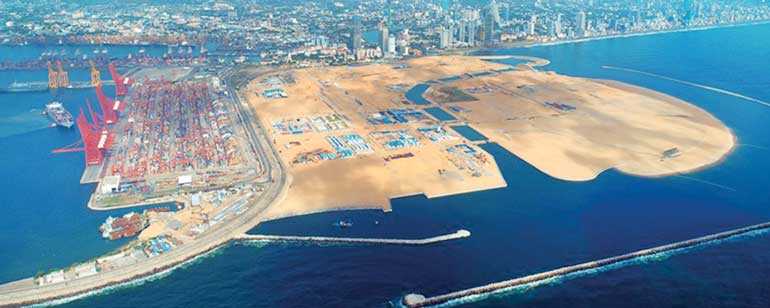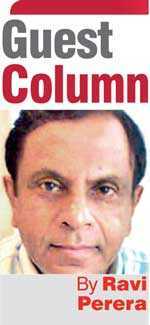Thursday Feb 26, 2026
Thursday Feb 26, 2026
Tuesday, 4 May 2021 00:00 - - {{hitsCtrl.values.hits}}

The success of a financial centre is proportional to the confidence it commands. For the world to trust us with their money, stability, integrity, professionalism, honest accounting and an excellent legal system are essential; the host country must have a good record itself
“The Lord said to Moses: ‘and I am come down to deliver them out of the hand of the Egyptians, and to bring them up out of that land unto a good land and large, unto a land flowing with milk and honey…”
 The Mahaweli Project, the magic wand
The Mahaweli Project, the magic wand
In the far away days of our youth, when our universe did not go beyond the shorelines of this little country, when everything was real and all things were possible, the Mahaweli Project was the magic wand, the multi-purpose development program that would make the country flow with milk and honey.
From ancient times agriculture was our mainstay; industries, trading or exploration did not interest the inhabitants except as rudimentary activities. Mahaweli being primarily an agricultural project, had ready approval, evoking atavistic visions of overflowing tanks and green fields.
Our young minds thrilled to the ambitious scope of the accelerated project, with the waters so diverted we would rise to true greatness, reclaim our destiny; export rice to a needy world, sell power to the crisis ridden Indian subcontinent, perhaps even waive off some of their debts.
More than the aid givers and the international funders, more than the planners, engineers, surveyors, technicians and the thousands of other workers, it was the ruling politicians we associated with the massive project.
In the silky white national costume symbolising their national mindedness, colour white for purity; photographs of politicians bent over maps of the area, receiving gifts of earth moving machines and tractors with beaming smiles, explaining the efficacy of the various canals and tunnels to foreign dignitaries, left a deep impression in our young minds.
The main actor, by far the most eminent, was the elderly J.R. Jayewardene; gravelly voiced, cosmopolitan and well-read. To reach the top of the greasy pole, he had gone through a hard school, navigated the labyrinth of our politics, out -manoeuvring all other schemers. Ours is not a politics of ideals, thinking or writing, but a melee for power and privilege, invariably using particularities like race, religion, caste or family. In 1977, having triumphed over an unpopular regime, JR quickly proceeded to arm himself with all the powers that a democracy could possibly bestow.
An immaculate white national costume contrasting sharply with an evident familiarity with Western thought and habit, Jayawardena cut an impressive figure; a bridge between two worlds? As later events revealed, there was the oriental too: inscrutable, ceremonious, sly and a certain facile quality which qualified the other attributes.
Seemingly pious (cameras often caught him reciting the five precepts with the gravest demeanour), pithy putdowns to hapless opponents, uproarious laughter (the best medicine!), sudden body-blow like manoeuvres to unbalance an already reeling Opposition; JR was the lord of his universe, at least until 1983. That fateful year was the high water mark, then came the ebb, JR increasingly looking inadequate; a confused old man grappling with a complex world, issues gradually slipping out of his grasp; the futility of it all apparent.
Corruption a way of life
About this time, I would get invited to the Colombo Swimming Club by some older friends who had prospered in the then booming business world, mainly as suppliers to the Mahaweli project. Things were very different those days; a European enclave, full of engineers working on the project.
When in town for a few days of rest and recreation, the club provided a haven; there was order, the beer was cold and the mugs were clean. As I recall, television had not yet been introduced to the country, the roads were appalling, telephone connections were very poor, only Colombo offered even a semblance of services.
After several swigs of the amber stuff, the atmosphere at the bar became loud, jolly, talk flowed freely, I would catch snatches of the conversation among the expatriate workers. Chuckling and snorting, they expanded on the sleaze among the local low as well as the high; the little cheatings of the former, the wily manoeuvring of the latter; the driver who routinely fiddled with his overtime claims, the minister who connived to direct sub-contracts to his brother-in-law.
Although I had heard about corruption in the system, its pervasive grip being spoken of by foreign mouths was new. They were contemptuous of a people for whom graft was not a matter of shame; more a way of life, an acceptable method of enrichment.
We would occasionally read in the newspapers about bribery and the inefficiencies of our public service. Generally, the criticism came from the Opposition, with the attached hint of partisanship. By and large, the Government ranks considered such criticism a challenge to their governance; reprobation depended on the culprit’s political/family affiliations.
Scathing assessment of Sri Lankan public service
The Sri Lankan public service was the only administration we knew, for its faults, we blamed a few rotten eggs, perhaps political appointees who haven’t had the benefit of graduating from one of the national universities. Naturally, our little experiences were limited only to the public services available in this country, there was no other standard we could compare them against. There was no judgment in our unexposed young minds.
The expatriate workers were scathing in their assessment of the public service: “There is no sense of urgency; you cannot get a clear answer ever; no one will accept responsibility, even the statistics are so doubtful; everything is just assumed, working on the hope that things will somehow work out” – these were some of the impressions they had formed of their native counterparts.
One scornful assessment stuck in my mind – “Not enough us building the generator for them, they will want us to switch it on for them every morning too,” a youngish engineer observed. In their opinion, we had a public service distinguished only by its inertia, answering to no performance standard; unable or unwilling to deliver.
To my young mind, these words were an epiphany, shameful as they were. I never thought that our “adults,” who constituted the public service, could be looked at in this manner, subject to such critical assessment. I knew several “uncles” who were in the public service; were they not performing what they are paid to do, are they up to scratch? I began to wonder whether adulthood was only a simple matter of age. Perhaps, a meaningful maturity requires other qualities as well. In that light, familiar things began to look different, unreal, a mere pantomime.
Their work done, the expatriates handed over their bungalows to the Mahaweli Authority, sold their cars, settled their bar bills and flew back to their countries. The country they left behind soon was engulfed in devastating terrorism; milk and honey did not flow, death and destruction pervaded the land.
With hindsight, the politicians of our youth now assume another character, dabblers and adventurers whose personal agendas and ambitions left the country in utter misery. They had grossly over-estimated themselves, undertaking endeavours far beyond their skills; their personalities contradicting the principles they professed. The bloody price for their misadventures was paid by a hapless nation in full measure.
The Port City Project, the nation’s great white hope
Now, nearly half a century later, the country reality is even more dismal, teetering on disaster. On 25,000 Square Miles live nearly 22 million people; a nation with huge debts, dwindling income sources and archaic systems. Desperate times call for desperate measures, once again, one big project has become the focus, a nation’s great white hope.
As a national endeavour, the Port City Project could not be more different (to the Mahaweli project). Only 10 years ago, the 600 something acres on which the project is situated did not even exist. It appeared like a phantom from the mists of the Indian Ocean, made possible by the capabilities of 21st Century engineering. There is no diverting of rivers or sowing of fields, we have simply reclaimed from the abundant ocean a dot of land on which will come up a contemporary mini -city, boasting world- class services, competing with dazzling international financial hubs like Singapore and Dubai.
Typically, the plan itself was never firm, the concept ill-defined; initially the talk was that there would be an entertainment centre on the reclaimed land: hotels, casinos, sporting facilities and high end apartments. When the government changed in 2015, the project was stopped abruptly, alleging that a proper environmental assessment was not carried out before the reclamation began. The Chinese developer claimed loss and we ended up incurring a huge contractual penalty.
Before long however, the reclamation work recommenced, we do not know what became of the environmental assessment, whether there were changes made to the filling methods, or whether we just caved in. In this world, he who pays the piper, calls the tune.
One would have thought that before billions of dollars’ worth reclamation work was begun, all the laws applicable including the management structures would have been in place. Apparently, not so; the filling work advanced rapidly, but the laws are still being formulated. The developer must have nerves of steel, we are notorious for being erratic, as well as slow.
In the meantime, while we were debating environmental issues, the impetus of the project seems to have turned towards a financial centre, taking the above mentioned mega cities as models.
Apart from the evident success of financial centres like Singapore, we point to China’s Belt and Road Initiative, the growing economy of India, our geographic location as encouraging factors. Often such virtues are more evident in theory than in reality; as the world changes, the relevance of various factors increase or decrease, adjusting to changing circumstances. While optimism is important, we must guard against fanciful expectations.
What a financial hub must offer
Mammoth projects of this nature are not automatic successes, financial centres are easy to talk about but difficult to achieve; what works in one country may not work in another. One culture may enhance a concept; another could diminish it.
A financial hub must offer security, efficiency, with world-class professionals and public officials performing at the highest level. The success of a financial centre is proportional to the confidence it commands. For the world to trust us with their money, stability, integrity, professionalism, honest accounting and an excellent legal system are essential; the host country must have a good record itself.
Long before Singapore became a global centre, these features were in place, statistically, they were a Developed country more than 20 years ago. Needless to say, Singapore’s public service is A plus. That is an exceptional achievement.
Before any venture, it would be useful to recall the wise maxim at Delphi’s Temple of Apollo – “Know thyself”.